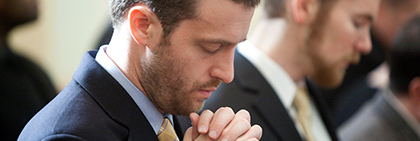
A Year of Discernment
Spend a year learning about Catholic culture, spirituality and the vocation of priesthood.
Fall Semester
The first semester is devoted to gaining insight and appreciation into the ancient and medieval sources of Catholic thought and culture. We begin by understanding the ancient, pre-Christian thought that would lay the foundation for early Christian Patristic thought and ways to understand God and creation, ultimately leading to the great synthesis of Christian culture and spirituality in the Middle Ages, as well as its late-medieval decline.
Selected readings from the following authors and works may include:
First Quarter: Homer, Hesiod, Aeschylus, Herodotus, Thucydides, Plato, Aristotle, Virgil, Athanasius
Second Quarter: Gregory of Nyssa, Augustine, Venerable Bede, Hildegard of Bingen, Bernard of Clairvaux, Bonaventure, Julian of Norwich, Catherine of Siena, Boethius, Chaucer
Spring Semester
The second semester focuses on modern Catholic thought and culture and invites participants to see how our contemporary Church and culture springs from and reacts to important thinkers. We begin by examining early modern thought and the religious culture of Renaissance Humanism, the Reformation and Counter-Reformation, with special attention paid to the Spanish Golden Age.
These themes are re-examined within 20th-century thinkers, with special attention paid to contemporary examinations of pilgrimage, immigration and the modern Latino experience.
Selected readings from the following authors and works may include:
Third Quarter: Erasmus, Thomas More, Luther, Milton, Pascal, John of the Cross, Theresa of Avila, Cervantes, Goethe, Voltaire, Vico, Kant
Fourth Quarter: Newman, Chesterton, Guardini, Pieper, Bonhoeffer, Nouwen/Stanley Rother, Hopkins, Ciszek, O'Connor, Frankl, Greene, Solzhenitzen, T.S. Eliot, C.S. Lewis, Dostoevsky